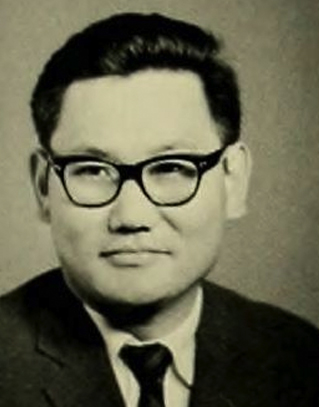
Faculty diversification began at ECU in the mid-1960s, with East Asians comprising a significant segment of the new non-white faculty. As early as 1959, Professor Yung Juin Yu had been hired by the Psychology Department, but only remained one year. Of the East Asian professors who joined the faculty, a considerable percentage were from Korea, as was Professor Yu, due to the upheaval resulting from the Korean War, 1950-1953, and American willingness to provide refuge and opportunities for the victims of the war. Among them was Yoon Hough Kim, an academically inclined young man who ended up teaching at ECU from 1967 until his death in 1976. Despite his brief career, Kim was among the leaders who helped expand the global dimensions of ECU’s faculty beyond the confines of the western status quo.
Kim was born in Hamhung in northern Korea in 1934. At that time, however, Korea was part of the Japanese empire. After the defeat of Japan in 1945, Kim was able to study briefly at Beijing University, but following the rise to power of the communists in 1949, he returned to his home in North Korea, which had also become communist, to resume his studies. However, with the onset of the Korean War in 1950, Kim fled to Pusan in South Korea.
In 1958, Kim earned a law degree in Pusan at Dong Ah University. In 1962, he traveled to the U.S., and entered the School of Social Work at the University of Minnesota where, in 1964, he completed his master’s degree, and in 1967, his Ph.D. Shortly after, he was hired by ECU’s Department of Sociology and Anthropology. Upon arriving at ECU, Kim declared “the United States is the most wonderful country in the world in which to live. I am extremely lucky to be outside of North Korea and in this country.”
As a scholar, Kim was a member of the American Sociological Association, the National Conference on Family Relations, and the Southern Sociological Society. In 1971, he was promoted to full professor, having published the year before The Community of the Blind: Applying the Theory of Community Formation. In the early 1970s, Kim began research on a new topic, racial attitudes and their neighborhood contexts.
In May of 1975, Jerry Paul, an attorney and ECU alumnus, had Kim testify in Superior Court in support of Paul’s motion for a change of venue for the murder trial of Joan Little, a black woman who had stabbed her jailor to death in an attempt, according to Paul, to defend herself from Alligood’s sexual assault. Kim testified that a previous statewide survey had shown that eastern North Carolina was more prejudiced against blacks than other sections of the state. The court ruled in favor of the change of venue and Little was subsequently acquitted of murder.
One year later, while riding his bicycle down Tenth Street towards his home in Brook Valley, Kim, 40, was fatally struck by a pickup truck driven by Philip Early Kelly of Kenland Manor Trailer Park. Despite Kim’s tragic death, he had, in his nine-year tenure at ECU, contributed to the school’s diversification, to research on those with special needs, and to matters of criminal justice in the state.
Sources
- “Sociology/Anthropology.” Buccaneer. 1976. P. 116. https://digital.lib.ecu.edu/15327
- Kim, Yoon Hough. The Community of the Blind: Applying the Theory of Community Formation. New York: American Foundation for the Blind, 1970.
- “Little Case Defense Witness Focuses On News Coverage.” Asheville Citizen-Times. May 1, 1975. P. 5.
- “Professor Dies Of His Injuries.” Daily Reflector. April 23, 1976. P. 12.
- Rabhan, Sandra. “Dr. Kim, Far East Scholar, Joins ECU Sociology Staff.” East Carolinian. Vol. 43, no. 5. September 26, 1967. P. 7. https://digital.lib.ecu.edu/39301
- “Y.H. Kim Computing Lab.” https://www.ecu.edu/buildings/brew/D213
More from Digital Collections

Citation Information
Title: Yoon Hough Kim
Author: John A. Tucker, PhD
Date of Publication: 7/12/2019